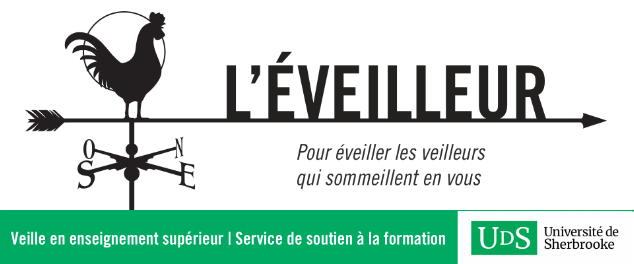Dans une lettre émise le 19 mars 2013, David A. Bergeron, “Acting Assistant Secretary for Postsecondary Education”, présente aux colleges américains les modalités pour obtenir l’approbation fédérale en vue d’offrir des programmes ne reposant plus sur l’heure-crédit. Cette approbation rend notamment les étudiants qui suivent ces programmes éligibles à de l’aide financière fédérale.
Dans les faits, cette lettre ouvre la voie à divers programmes qui peuvent être complétés par la “démonstration de l’atteinte de seuils de compétence plutôt que par le cumul de crédits réalisés” (selon les mots de Catherine Vallières, dans un article sur la Western Governors University). Ce que la presse spécialisée et le milieu universitaire américain nomme le “competency-based learning” et qu’il faudrait probablement traduire par “approches par compétences”. [Compte tenu de la signification particulière de ce vocable pour nos institutions, nous continuerons pour le moment à utiliser l’expression anglophone.]
La lettre donne un vote de confiance très clair à ces programmes et à leur corollaire, le “direct assessment”:
“Competency-based approaches to education have the potential for assuring the quality and extent of learning, shortening the time to degree/ certificate completion, developing stackable credentials that ease student transitions between school and work, and reducing the overall cost of education for both career-technical and degree programs. The Department plans to collaborate with both accrediting agencies and the higher education community to encourage the use of this innovative approach when appropriate, to identify the most promising practices in this arena, and to gather information to inform future policy regarding competency-based education.”
Contrairement à ce que nous avions d’abord pensé, ce n’est pas la Western Governors University, mais bien la Southern New Hampshire University (dont nous avons parlé dans le passé pour son approche quelque peu lapidaire de la formation en ligne) qui bénéficiera la première du feu vert gouvernemental pour offrir de tels programmes.
Cela écrit, le Département de l’éducation demande aux institutions de faire elles-mêmes la démonstration que leurs programmes sont bien équivalents avec des programmes similaires mesurés en heures-crédits:
“• Instead of using credit hours or clock hours as a measure of student learning, instructional
[…]
programs may use direct assessment of student learning, or recognize the direct
assessment by others of student learning. Examples of direct measures include projects,
papers, examinations, presentations, performances, and portfolios.• As a part of its application, the institution must explain how it determined the equivalent
number of credit or clock hours for the program, i.e., its methodology for determining
these equivalencies.• An institution must demonstrate that its institutional accrediting agency has reviewed and
approved its offering of the direct assessment program.• An institution must demonstrate that its institutional accrediting agency or State licensing
body has agreed with the institution’s assessment of its credit or clock hour
equivalencies.”
Une autre clause ouvre la porte à toutes sortes de sous-traitances (Doit-on y voir une allusion aux MOOC?):
“• A direct assessment program may use learning resources (e.g., courses or portions of
courses) that are provided by entities other than the institution providing the direct
assessment program without regard to the limitations on written arrangements between an
eligible institution and an ineligible institution or organization under 34 CFR 668.5(c)”
Chose sûre, la lettre envoie un signal clair au milieu universitaire:
The support from Washington could lend a major boost to competency-based education, said Amy Laitinen, deputy director for higher education at the New America Foundation and a former department policy adviser.
“It’s like a big neon sign saying ‘use this,’ ” said Laitinen, who last year wrote a report that was critical of higher education’s purported overreliance on the credit hour. (Fain, 2013)
Si la porte est ouverte, les responsables du Département ont bien l’intention de suivre le dossier et d’émettre d’autres recommandations au fur et à mesure que les besoins se présentent (Fain, 2013).
Sources:
Bergeron, David A., “Applying for Title IV Eligibility for Direct Assessment (Competency-Based) Programs” (lettre officielle), Département de l’éducation américain, 19 mars 2o13.
Fain, Paul, “Beyond the Credit Hour”, Inside Higher Ed, 19 mars 2013







Le eCampus News de mai fait sa une de « ED [Education Department] Backs Competency-Based Learning »: http://www.ecampusnews.com/current-issue/?pagenumber=16
On y apprend peu de nouveau sinon que l’on réfléchit aux impacts de cette décision sur le développement et l’évaluation de tels programmes.
« It’s a Catch-22: Without regulatory certainty, colleges will be reluctant to have their programs evaluated on a basis other than time,” [Amy] Latinen wrote. “But until more colleges built programs around verifiable student learning outcomes, it will be difficult for regulators to fully move away from time. »
Un autre nom d’université qui penche vers cette méthode est cité: La Northern Arizona University.